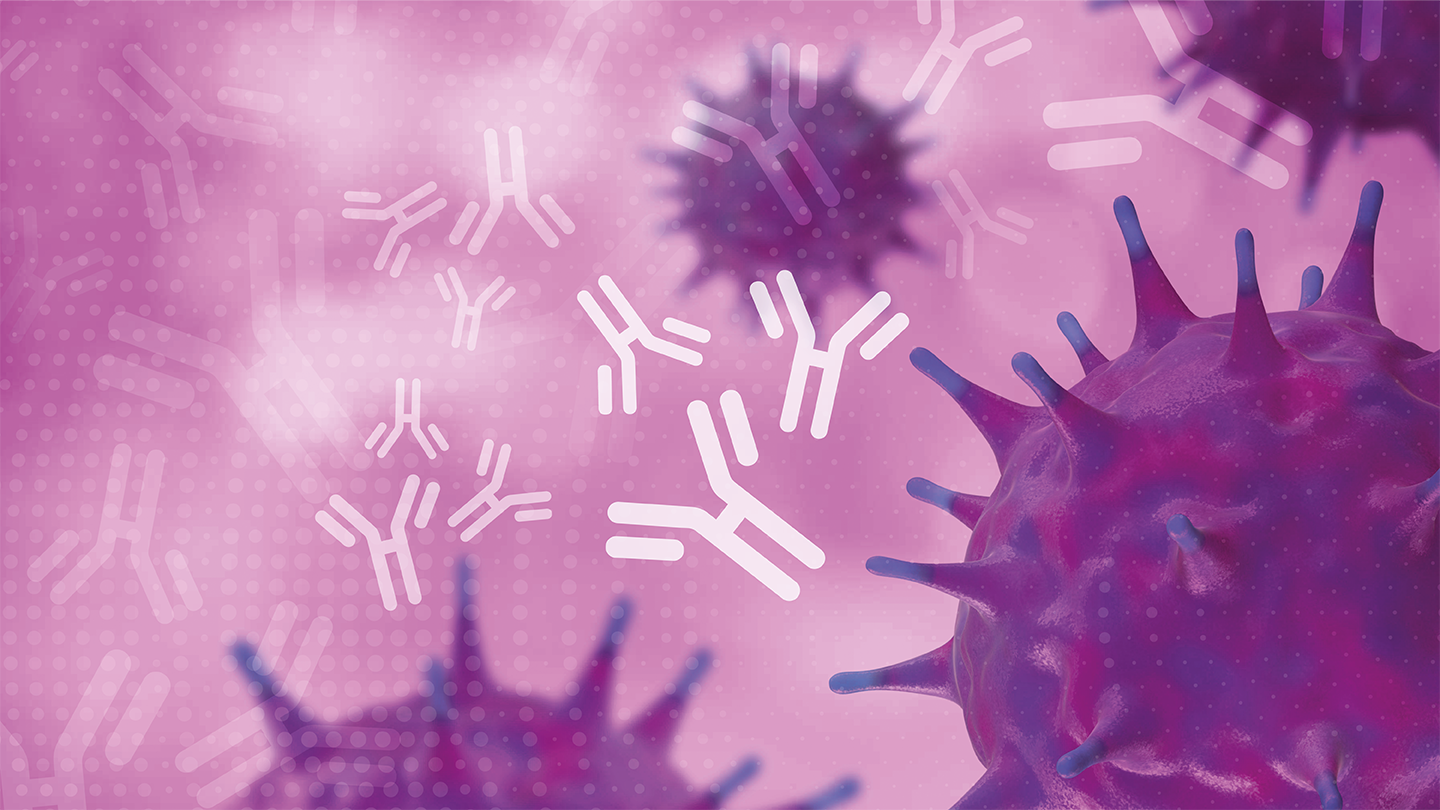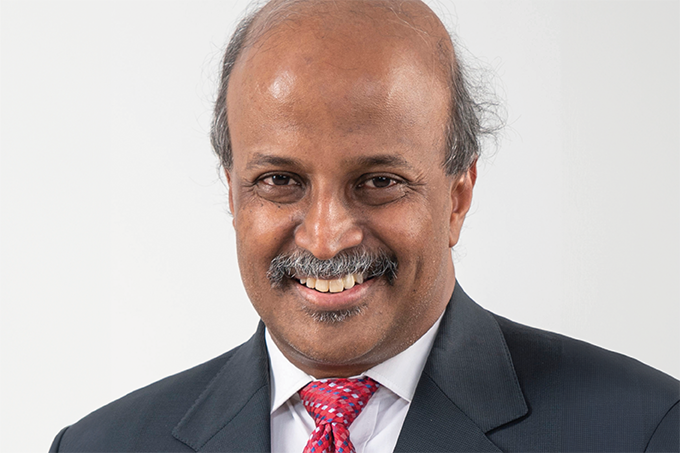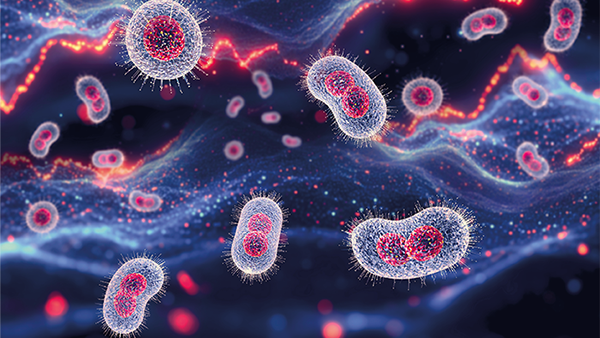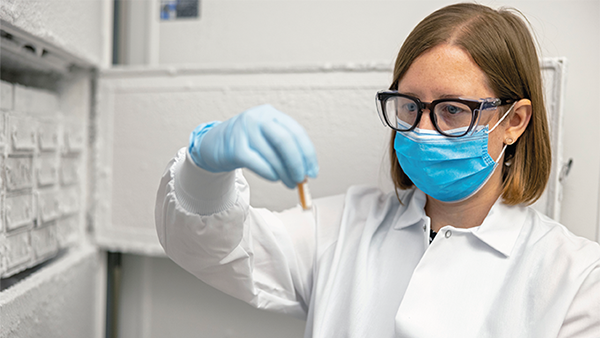Career Stories with Baylee Briones
Life as a traveling medical laboratory scientist
What inspired you to pursue a career as a medical laboratory scientist (MLS)?
I have always had an interest in science and medicine, even as a child. I grew up with family members in healthcare and saw the impact they had on the patients they cared for. When my mother was unable to secure childcare, I would accompany her while she worked as a Certified Nursing Assistant in a medical office as well as a nursing home. After observing her at work, I thought I wanted to care for people in their most vulnerable state, so I decided to pursue a nursing career because that was what I had the most exposure to.
After a few academic challenges, I realized nursing was not my passion, but I excelled in my microbiology prerequisite class and, after spending a few afternoons with the lab assistant, he recommended I talk to Rodney Rohde at Texas State about my academic options in the laboratory. Dr. Rohde explained what a career in clinical laboratory science (CLS) would entail and I realized I could still play a critical role in patient care, without directly providing care. I changed my major that week and applied to the program at Texas State as soon as I could.
Did you encounter any challenges in your path to becoming an MLS?
Absolutely. I do not shy away from my failures because I believe they have provided me with the best learning experiences and have made me more adaptable as a scientist. During my second year at Texas State as a pre-nursing major, I struggled to balance coursework and working to support myself. My grades dropped and eventually I failed out of my anatomy and physiology course. I no longer held my Dean’s list status and my GPA dropped substantially in just one semester. This was heartbreaking because it felt like much of my hard work was for nothing. I felt lost as I had no backup plan and was on the verge of losing my financial aid.
Finding the CLS program was a beacon of hope; however, due to my low GPA and the program’s competitive nature, I was not accepted my first time applying. I had changed my major and applied to the program in less than a week, so I really did not have much time to prepare myself to be a strong applicant. I took a year off to recoup and assess where I stood and, by my second time applying, I was much more prepared and came back a stronger applicant. Little did I know, acceptance into the program was just the beginning; the program itself was rigorous to the point where I had to quit my job – making the last two years of college even more of a financial challenge than before. I pushed through and gave it my all, and in the end I graduated with honors and a job offer.
What surprised you most when you entered the workforce after training?
Entering the workforce, I was surprised at how demanding healthcare can be. Learning the material in school is one thing, but applying it under the pressures of a real world setting requires a different set of soft skills. Healthcare requires working odd hours that can impact one’s health and social life; sometimes, we have to work long shifts consecutively to help relieve staffing shortages. To add to the fire, the work itself can be difficult. In departments like Blood Bank, we face scenarios such as responding to Massive Transfusion Protocols, which is where a patient is quickly bleeding out. In these scenarios, we must think and act quickly to provide blood to the patient as fast and as safely as possible. There is no leeway for mistakes in Blood Bank, as providing incompatible blood can cause life-ending reactions in a patient. Additionally, we are often responsible for multiple departments at once, so we constantly have to juggle varying tasks and know what to prioritize.
Our workloads were exacerbated by the COVID-19 pandemic – we had to be adaptable and handle sudden large testing workloads while dealing with rapidly changing procedures. I never thought I would develop compassion fatigue because I don’t work directly with patients, but constantly being exposed to death started to take a toll on my own mental health.
What does a typical day look like for you as an MLS?
A typical day depends on the department I’m handling and the shift I’m working; however, most days start with me troubleshooting and cleaning up anything that may have been missed in the earlier shift. After that, we must perform maintenance on our instrumentation and run quality control to make sure the instruments are performing to standard and releasing accurate results.
Next, I run the actual samples. In Chemistry, this is mostly automated and I spend most of my time reviewing results for discrepancies and calling the provider with any critical results. In Hematology, I may have to manually look at a blood smear and perform a manual cell differential. Blood Bank is the most manual department – I perform blood typing and antibody screening to make sure we provide compatible blood to the patient, and I have to keep track of inventory and work closely with the blood center depending on patient need. In Microbiology, I have to do “plating,” where I strategically smear a specimen on a plate containing nutrients that grow the bacterial colonies used for identification and antibiotic susceptibility. We also read Gram stains as a general way of identifying bacteria and leading the provider on the right track. In addition to patient testing, we sometimes do other tasks around the lab such as organizing inventory, making sure documentation is being completed, or performing proficiency testing.
You’re currently traveling while working as an MLS. Tell us about that…
I have been a traveling scientist for two years now and have worked in Texas, Oregon, and California, and I’m currently working in Central New York. For the most part, the work itself is generally the same – I do patient testing, maintenance and quality control in every lab with minor changes to the test menu or techniques. The biggest differences have been the working conditions. So far, California – specifically the San Francisco Bay Area – has felt like the best place to be a CLS. Despite the high cost of living, the pay felt more proportional and fair for our work, and it had better benefits such as mandated COVID-19 pay. Not to mention, the state itself is beautiful! My workplace in Oregon also had more positive aspects because they had the perks of Union representation. Pay and benefits were favorable with salary transparency in the lab and more frequent raises.
Overall, I’ve come to realize the unfavorable working conditions in the South compared with other regions in the country; particularly, pay is generally much lower compared with the cost of living in big cities. Keep in mind that Texas is an unlicensed state compared with California and New York, which are both licensed. Oregon is still unlicensed, but having a solid Union made up for the benefits that came with licensure.
Licensure means a profession is regulated by a governmental entity, so there is more legality involved. By establishing legal requirements in a profession, there is a minimum standard met to ensure we are the most qualified to provide quality care to patients – not to mention, there are actual legal consequences to breaching one’s scope of practice. On the other hand, certification is a voluntary, self-regulated entity. For example, I am currently certified as a Medical Laboratory Scientist by the American Society for Clinical Pathology. To gain certification, I had to attend an accredited university to sit for and pass the board exam. Many unlicensed states still require certification to work as an MLS, but we are noticing more and more hospitals reducing the requirements to work in the lab as staffing demands increase.
Although certification is still a rigorous process, requiring licensure ensures we are staffing the most qualified people because it clearly defines who is legally eligible to perform laboratory testing. As a result, licensed MLS’s generally see higher pay. When comparing other professions, doctors, nurses, dentists, and even cosmetologists are required to be licensed to practice, so why not include a profession as important as the laboratory in that category? I am currently working on obtaining my Louisiana license as I’d like to compare the pay and working conditions of a licensed state in the South.
By traveling, I’ve had exposure to a variety of work environments and I’ve learned how much the laboratory work culture can differ. I’ve even been able to see how patient demographics and environment can change a lab. For example, Lyme disease testing is done frequently in New York, whereas that was almost unheard of in Texas. Hospital size can especially make a difference, as I’ve worked in a smaller hospital where I had more face-to-face contact with nurses and people outside of the lab. It seemed there was less of a gap regarding knowledge of the lab because nurses would take the time to ask questions about sample requirements, our rejection criteria, and more. We also were able to hear their side of things and the challenges they can face obtaining a quality sample for us.
Work aside, I am grateful for my opportunity to travel, as I’ve been able to experience different parts of the country as a local. Traveling has also expanded my networking beyond my bubble at home, since I now have friends and professional relationships spanning several states. The friendships I’ve made have helped me expand my knowledge of the different walks of life across the US. Despite the hardships that come with uprooting my stable home life, traveling has brought value into my life by shaping me into a more resilient and flexible person, not just in my career, but in my personal life as well.
What’s your favorite part of your work?
My favorite part is doing the actual testing. I love when I can take my time working up an antibody in Blood Bank, which feels like a puzzle, or doing a challenging manual differential and being the first to identify cancerous cells in a patient. To me, the manual differentials can feel like I’m looking at a picture book of a patient’s blood. I also love being a part of the patient care team, without doing much contact with anyone outside the lab.
My work can feel extremely gratifying when I’ve completed a difficult task and I know I’m making a difference for the patient. One example that comes to mind happened when I was still new in my career and had trouble identifying uncommon cells. I was looking at a blood smear from a 19–20 year old male in the emergency department with no history and the only listed symptom being fatigue. I couldn’t identify the cells so I sent it for pathology review because I knew something was off; the next day, I checked the pathology report and the patient had been diagnosed with leukemia.
What’s the most unique experience you’ve encountered so far?
Definitely the week I had to work during “Snowpocalypse 2021” here in Texas! Healthcare never closes, so despite record weather conditions, I still showed up to work. Texas was completely unprepared for an event like this; roads were unplowed and eventually iced over, which turned my 15-minute commute into an hour driving in snow and ice. The laboratory had unplanned downtime and extreme staff shortages because people were blocked by the snow – it took us days to recover from that downtime because we had to do all the documentation manually with minimal staff.
How can the medical laboratory increase interest and recruitment in the field?
We need to get out there more and integrate ourselves with other healthcare professions. People have no idea we exist! Even the TV program House shows doctors performing the lab testing, which is not the case at all. Students need to know there are options outside of nursing or medical school, especially for people like myself who prefer to work with minimal patient contact. Additionally, we must increase wages to entice people not just to join, but stay in the field. It’s not uncommon for medical laboratory scientists to eventually go back to school and seek other opportunities, or people like myself who take on contract work for better economic options.
What advice would you give to students considering a career as an MLS?
Get out there and see what the lab is about – you can seek out programs in your area and ask to talk to current CLS students or professors. Additionally, look for volunteer opportunities through your school. I volunteered through an organization called Medical Explorers at Texas State; some of my volunteering included medical mission trips and working with hospice patients. Eventually, I was able to get my foot in the door at a local hospital and they placed me to volunteer inside the lab to see actual medical laboratory scientists at work.
You can also get involved through entry level positions such as phlebotomy, medical laboratory technician (the two-year degree), or any role that has contact with the lab such as Certified Nursing Assistant or surgical technician. If you are set on applying to a CLS program, prepare yourself for a rigorous two years and lots of intense studying that will eventually pay off.





